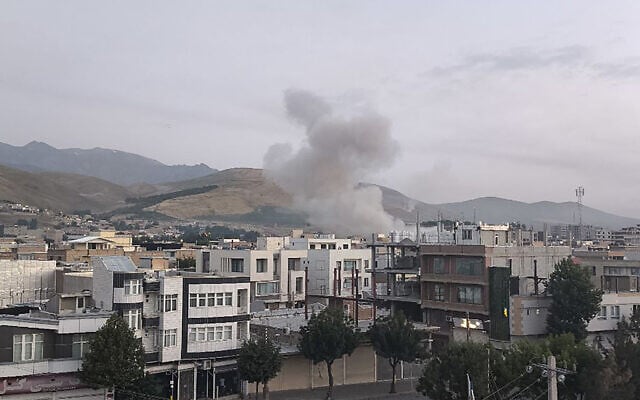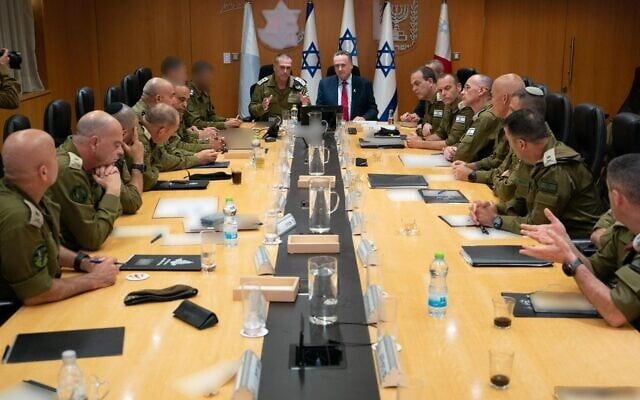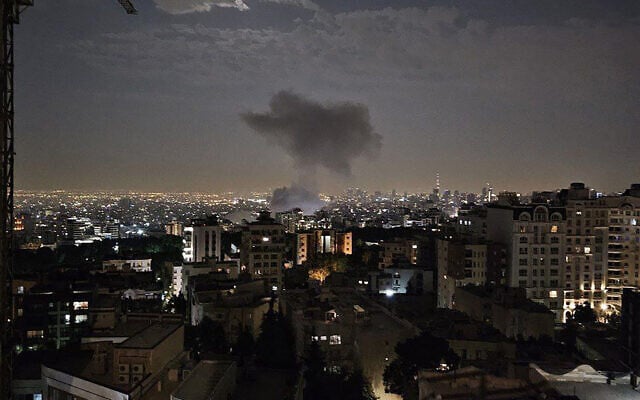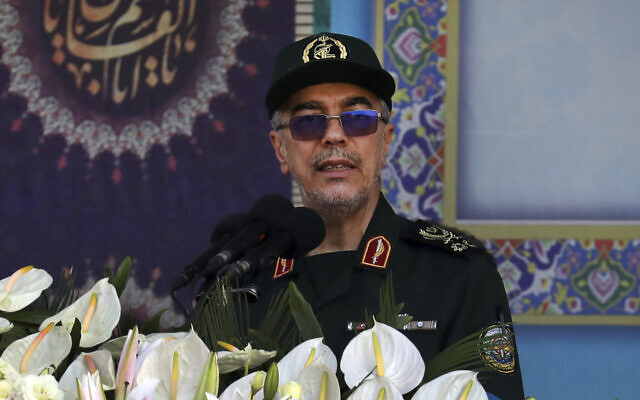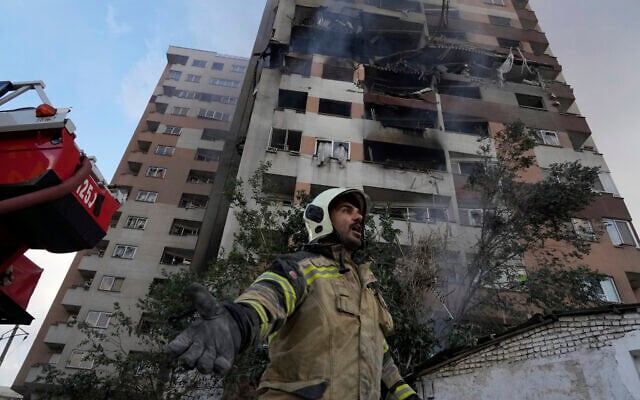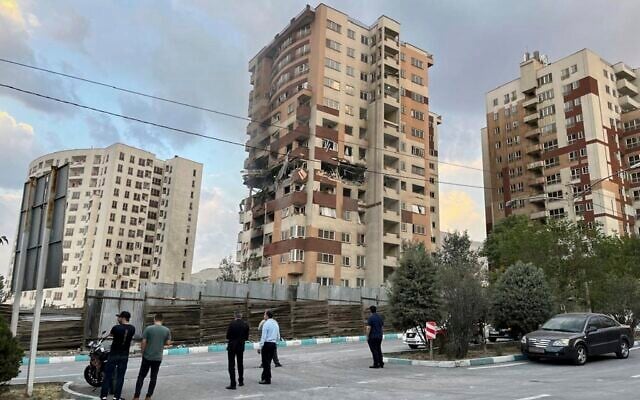


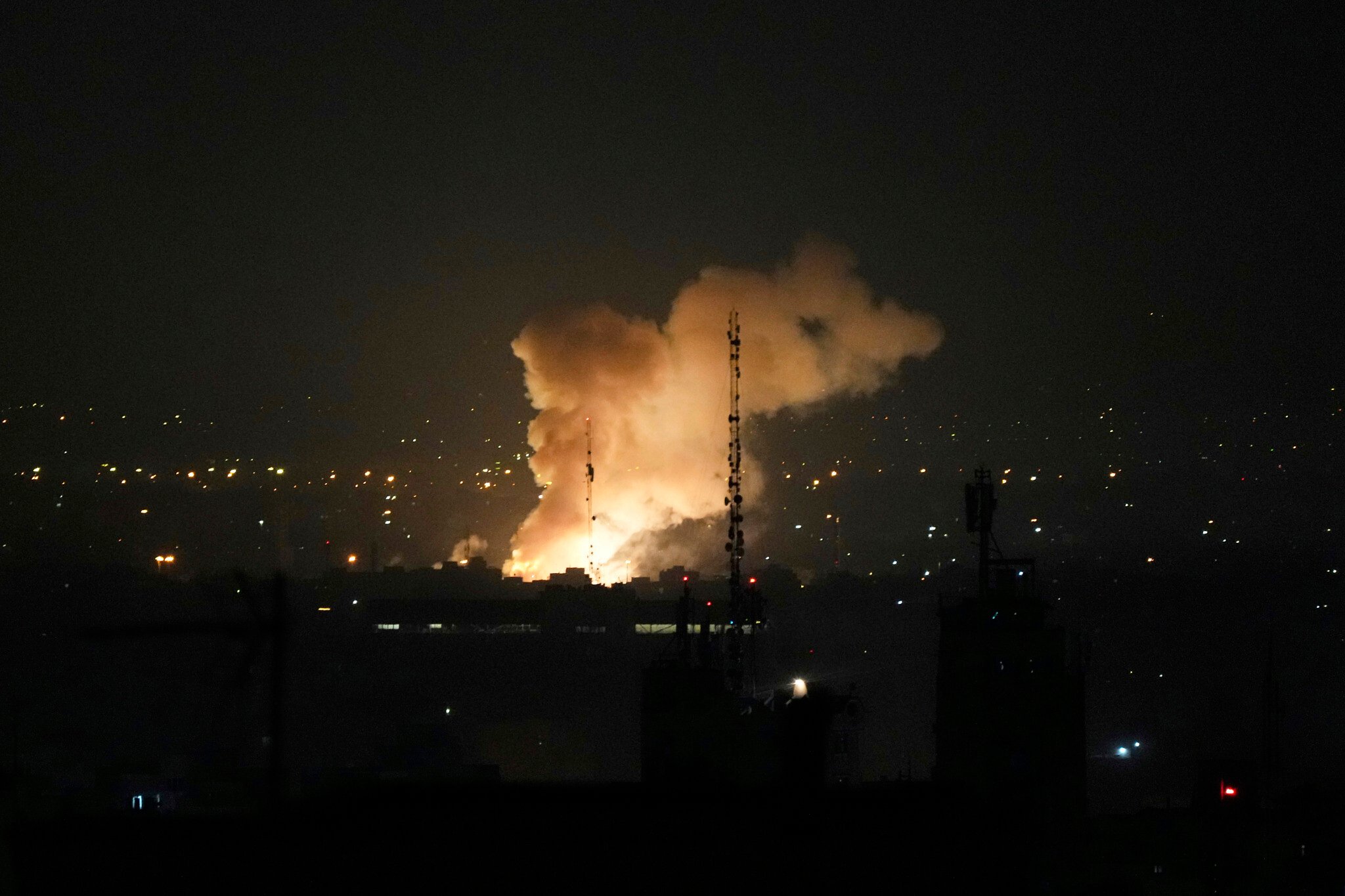
Decades of Israeli warnings against Iran’s nuclear program and preparations for military action to thwart it culminated early Friday morning with the Jewish state launching a major offensive against the Islamic Republic, striking nuclear sites, military facilities, missile bases and senior leadership.
Jerusalem said it had engaged in a “precise, preemptive strike” against Iran, declaring an imminent threat from its nuclear program and announcing a domestic state of emergency as citizens braced for retaliation. Top officials warned of a potential prolonged conflict, noting that Tehran had the power to inflict significant pain upon Israel.
Multiple waves of Israeli strikes were reported throughout Iran for several hours, starting at around 3 a.m. and into the morning.
The operation, dubbed “Rising Lion,” was directed at Iran’s nuclear program — the military assessed Iran currently has enough enriched uranium to build 15 nuclear bombs — as well as its ballistic missile factories and its military capabilities, Prime Minister Benjamin Netanyahu and the military said.
Israel said it had no choice but to attack Iran, adding that it had gathered intelligence that Tehran was approaching “the point of no return” in its pursuit of a nuclear weapon.
“The Iranian regime has been working for decades to obtain a nuclear weapon. The world has attempted every possible diplomatic path to stop it, but the regime has refused to stop,” the military said in a statement.
Confirmed killed in the strikes was Islamic Revolutionary Guard Corps Commander Hossein Salami. Iran’s semi-official Fars news agency reported that the chief of Iran’s military, Mohammad Bagheri, was also dead. Jerusalem assessed that other top brass and senior nuclear scientists were killed as well.
Blasts were reported in Natanz, the site of a key nuclear facility, as well as in and around the capital Tehran.
The Israeli operation was expected to last days, according to military officials, who added that the IDF was preparing for heavy fire from Iran, but asserted that “at the end of the operation, there will be no nuclear threat” from the Islamic Republic.
Shortly before 3 a.m., reports emerged of heavy jet presence over Iraq. Sirens were then heard throughout Israel and loud warnings were pushed to Israelis’ phones to alert them to the fact that a major offensive was underway, and Iranian retaliation was expected. The sirens did not come in response to any missile fire, but citizens were instructed to stay near protected spaces.
Meanwhile, Defense Minister Israel Katz announced a state of emergency as Netanyahu convened a cabinet meeting and Israel closed its airspace.
The IDF said dozens of aircraft took part in “the opening blow, which included strikes on dozens of military targets, including nuclear-related sites in various areas in Iran.”
In a video statement, the chief of the Home Front Command, Maj. Gen. Rafi Milo, said sirens were expected to sound in wide areas of Israel once Iran began its anticipated counterattack.
IDF Chief of Staff Lt. Gen. Eyal Zamir said the military was “mobilizing tens of thousands of soldiers and preparing across all borders.”
“People of Israel, I can’t promise absolute success. The Iranian regime will attempt to attack us in response. The expected cost will be different from what we are used to,” Zamir said, but he emphasized, “We have been preparing this operation for a long time.”
In the West Bank, all Palestinian towns were under lockdown until further notice. In the north, the IDF said it was mobilizing troops to be ready to defend or attack if needed.
Netanyahu and Iranian state TV confirmed that one target of the strikes was the Natanz enrichment facility, one of two underground nuclear sites in the country, the other being at Fordo.
The “Natanz enrichment facility has been hit several times,” state TV reported Friday morning, showing footage of heavy smoke billowing from the site.
The extent of the damage was unclear — Iranian state television only briefly showed the live picture with a reporter.
The official IRNA news agency also reported a number of deaths in Tehran, naming neighborhoods in multiple locations in the capital, after residential buildings were hit by strikes.
In tandem with the IAF airstrikes, Axios reporter Barak Ravid told CNN that Israel’s Mossad spy agency carried out a series of covert sabotage operations “deep” inside Iran against the Islamic Republic’s air defenses and missile facilities. Ravid cited an unnamed senior Israeli official.
Iranian state media confirmed that Islamic Revolutionary Guard Corps Commander Hossein Salami was killed in an Israeli strike. Iran’s Revolutionary Guard, one of the main power centers within the country’s theocracy, controls Iran’s arsenal of ballistic missiles.
Nuclear scientists Fereydoun Abbasi-Davani and Mohammad Mehdi Tehranchi were also confirmed killed by state TV.
A defense official told The Times of Israel shortly after 4 a.m. Israel time that Jerusalem believes the chief of Iran’s military, Mohammad Bagheri, and senior nuclear scientists were eliminated, saying the likelihood of their deaths is “increasing.”
And an Israeli defense official told Army Radio overnight: “The opening strike included air defense targets, [strikes on] surface-to-surface missiles, and a wide wave of senior Iranian officials being neutralized, timed with great precision — simultaneously hitting the Iranian General Staff and nuclear scientists across Iran.”
He added: “If this opening strike succeeded — then what we did to senior Hezbollah officials over 10 days — we did to Iran in 10 minutes.”
US President Donald Trump was slated to convene a meeting of his National Security Council on Friday at 11 a.m. local time (6 p.m. in Israel) to discuss the attack, the White House announced.
The strikes came just days before the next expected round of negotiations between the US and Iran over the latter’s nuclear program.
Trump has said repeatedly that Iran must not obtain a nuclear bomb, but has stressed that he would prefer to avoid that outcome through diplomacy rather than military action, and publicly urged Israel not to strike with talks ongoing, as recently as Thursday evening.
The Islamic Republic, which vows to destroy Israel, says its nuclear program is for civilian purposes. However, it enriches uranium up to 60 percent — a level that has no civilian purpose and is close to the 90% threshold needed for a nuclear warhead — and has obstructed international inspectors from checking its nuclear facilities.
US Secretary of State Marco Rubio said immediately after the attack began that Israel took “unilateral action against Iran,” stressing that the US was not involved and warning that Tehran should not target the US in response.
“Our top priority is protecting American forces in the region. Israel advised us that they believe this action was necessary for [their] self-defense,” he said in a statement.
“President Trump and the administration have taken all necessary steps to protect our forces and remain in close contact with our regional partners,” he added. “Let me be clear: Iran should not target US interests or personnel.”
Israel’s ambassador to the United Nations said Israel has an ongoing dialogue with the United States, but its determination to strike Iran was an independent Israeli decision.
When asked in a CNN interview if Israel expected the US to assist Israel in case of an Iranian response, Israel’s UN Ambassador Danny Danon says: “Don’t think we should go into speculation.”
In a video statement issued separately in Hebrew and in English early Friday morning, Netanyahu presented the airstrikes as a preemptive response to an imminent, existential threat.
“We can’t leave these threats for the next generation,” Netanyahu said, “because if we don’t act now, there will not be another generation. If we don’t act now, we simply won’t be here.”
He said that Iran has enriched enough uranium for nine nuclear bombs, and that in recent months it took unprecedented steps toward weaponization.
Iran has also built “a massive store” of ballistic missiles, he continued. “These missiles reach Israel from Iran within minutes. Each one carries a ton of explosives.”
Iran planned to produce 20,000 such missiles within six years, Netanyahu asserted, “therefore we are operating to remove [them] as well.”
“‘Never Again’ is now,” Netanyahu said, using the cry that emerged from the Holocaust. “We have internalized the lessons of history: When an enemy says he intends to destroy you — believe him. When the enemy develops the capabilities to destroy you — stop him.”
The prime minister thanked Trump “for his steadfast stance,” saying that “time and again, he made it clear: Iran must never be allowed to obtain nuclear weapons.”
A defense official said overnight that Netanyahu and Katz had already on Monday signed a directive ordering the IDF to prepare for its action in Iran. In coordination with Zamir, Netanyahu and Katz “decided on the operation date — today,” the official added.
In his video, Netanyahu also addressed the Iranian people directly: “We do not hate you. You are not our enemies. We have a common enemy: a tyrannical regime that tramples you,” he said. “For nearly 50 years, this regime has robbed you of the chance for a good life.”
“I have no doubt that your day of liberation from this tyranny is closer than ever. And when that day comes, Israelis and Iranians will renew the alliance between our two ancient peoples. Together, we will build a future of prosperity, a future of peace, a future of hope,” he continued.
Leon Kraiem, Nava Freiberg, and Sharon Wrobel contributed to this report.

